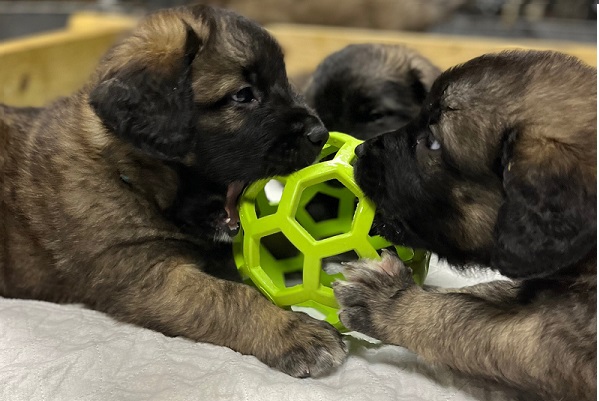Bringing a Leonberger puppy into your life is a joyful experience filled with cuddles, laughter, and the occasional muddy pawprint. But alongside love and play, your Leonberger’s early months are a crucial time to lay the foundation for a confident, well-adjusted adult dog. One of the most important aspects of this foundation is socialisation.
In this post, we’ll explore what socialisation really means, why it matters so much for Leonbergers in particular, and how you can ensure your Leo pup grows up to be the gentle giant they’re meant to be.
What Is Puppy Socialisation?
Socialisation is the process of gently and gradually introducing your puppy to a wide variety of experiences—people, animals, environments, sounds, smells, and objects—during the early months of life.
The critical window for socialisation is between 3 and 16 weeks of age. During this time, your Leonberger is naturally curious, open to new experiences, and more adaptable. Positive exposure during this phase has lasting benefits; neglecting it can result in a fearful or reactive adult dog.
Why Socialisation Is Especially Important for Leonbergers
Leonbergers are known for their gentle, patient, and affectionate nature. Bred originally as working dogs and companions, they are naturally sociable. However, due to their giant size and strength, a poorly socialised Leo can become a challenge to manage, even if their intentions are good.
Here’s why early socialisation is a non-negotiable for this breed:
- 🐾 Size Matters: A Leonberger can weigh up to 75 kg (165 lbs). If your Leo becomes fearful or reactive, it’s much harder to control than a smaller dog.
- 🧠 Intelligence and Sensitivity: Leos are highly perceptive and attuned to their environment. Without positive early experiences, they can become anxious or overwhelmed.
- 🧸 Companionship Drive: They crave close relationships with their family and are generally very people-oriented. Socialisation helps them feel confident and comfortable in human spaces.
Benefits of Early Socialisation
When you socialise your Leonberger properly, you’re not just preventing problems—you’re actively shaping a well-rounded dog. Some key benefits include:
- Confidence: Your puppy learns that the world is safe and interesting, not scary or threatening.
- Adaptability: A socialised Leo is more at ease with new environments, making travel, vet visits, and grooming easier.
- Better Behaviour: Social dogs are less likely to bark excessively, react aggressively, or act out in unfamiliar situations.
- Stronger Bonds: Experiences shared during socialisation build trust and deepen your bond with your puppy.
What Should You Socialise Your Leonberger To?
Here’s a helpful checklist of experiences to gently expose your puppy to between 3–16 weeks:
People
- Adults of different ages, genders, and appearances
- Children (always supervised)
- People with hats, glasses, beards, umbrellas, wheelchairs, walking sticks
Other Animals
- Calm, vaccinated dogs of various sizes
- Cats (if safe and supervised)
- Livestock or small pets, depending on your living situation
Places
- Parks
- Pet-friendly stores
- Sidewalk cafés
- Car rides (short and positive)
- Vet clinic (for a social visit without treatment)
Sounds
- Vacuum cleaners, hair dryers
- Cars, sirens, buses
- Thunderstorms (recordings can be used safely)
- Loud voices or laughter
Handling
- Touching paws, ears, tail, belly
- Brushing
- Wearing a harness
- Nail trimming (gentle desensitisation)
How to Socialise Your Leonberger Safely
Socialisation should never be overwhelming or forced. Here are some best practices:
- Go at your puppy’s pace: Watch for signs of stress (tail tucked, yawning, hiding) and back off if needed.
- Use treats and praise: Make new experiences positive with high-value rewards.
- Keep it short and sweet: A few minutes of positive exposure is better than a long session that goes wrong.
- Avoid dog parks: These are often too chaotic and risky for young puppies. Opt for playdates with known, vaccinated dogs instead.
- Vaccination matters: Talk to your vet about balancing early socialisation with disease protection. Many controlled environments are low-risk and extremely beneficial.
Continuing Socialisation Beyond 16 Weeks
While the critical window may close, socialisation should continue well into adulthood. Leos, like humans, are lifelong learners. Keep exposing your dog to new experiences in a positive, gentle way—especially during adolescence (6–18 months), when fear periods may resurface.
Final Thoughts
At [Your Kennel Name], we begin the socialisation process before our puppies ever go to their new homes. By the time they join your family, they’ll have already experienced gentle handling, household sounds, car rides, and interactions with people and dogs. But the baton then passes to you, the owner, to continue this essential work.
A well-socialised Leonberger is not just easier to live with—they’re a joy to take into the world. They’re the dog who calmly greets visitors, lounges peacefully at your feet in a café, and becomes a beloved part of every community they enter.
Socialise early, socialise often, and watch your Leonberger flourish into the magnificent companion they’re born to be.
Interested in learning more about raising a happy, balanced Leonberger?
Check out our some of the other posts on this blog!




